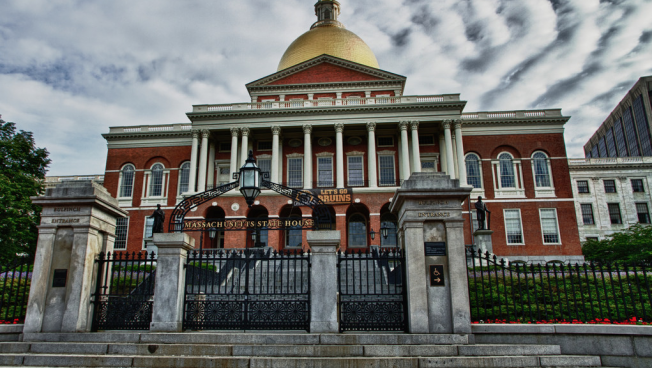Pioneer Institute Celebrates Sunshine Week 2019
Sunshine Week is dedicated to bringing greater awareness to the importance of government transparency and to highlighting areas where improvement is needed. After all, a healthy democracy is unsustainable unless people are fully informed and can meaningfully engage in the democratic process.
To celebrate Sunshine Week, each year Pioneer reviews some of its recent work to bring greater public accountability to Massachusetts government. Our objective is for the Commonwealth to rank among the nation’s most transparent states.
Sadly, in its latest rankings, the Center for Public Integrity placed Massachusetts among the worst states for public records access. While there has been some progress since then to bring sunshine to Beacon Hill, many would say a persistent gray cloud looms over the golden dome.
Please enjoy some of Pioneer’s highlights:
Pioneer Institute launched MassWatch
MassWatch is dedicated to promoting citizen engagement in state and local government. As Justice Louis Brandeis said, “the most important political office is that of the private citizen.”
MassWatch helps you explore trends in salaries and expenditures through MassOpenBooks.org. MassAnalysis.com will show you how your community’s finances stack up compared to its peers. And MBTA Analysis is a site you simply can’t miss; comb it for data and help us fix the T! Open MassPensions at your own discretion – some of those unfunded liabilities of the state’s 105 public pension systems are pretty scary! All this is available in one place – visit MassWatch!
Our state legislature isn’t subject to public records law. In fact, it exempted itself when it enacted the law decades ago.
The absurdity of that isn’t lost on all legislators, and a special legislative commission was formed to review and make recommendations about the exemption. Pioneer testified three times and Pioneer’s director of government transparency, Mary Connaughton, wrote a letter to the commission addressing the constitutional inconsistencies of the exemption. Despite the efforts of many government transparency enthusiasts, the commission disbanded, unable to achieve consensus. Perhaps someone should take the issue to the Supreme Judicial Court?
Time for the Bay State to require elected officials to submit public financial disclosures every year. 31 states post disclosures online for free & open viewing but MA is not among them.
A new Pioneer report finds there’s much more to do if the Commonwealth is to make the Statements of Financial Interest (SFIs) that public officials file annually truly accessible to Massachusetts citizens. Read coverage of this great report in the State House News Service, and an editorial endorsement from The Springfield Republican.
Can you believe it? Once again we hereby proclaim Pioneer’s own Greg Sullivan as “Mr. Sunshine”!
When UMass officials claimed the university had a revenue problem and needed more funding, Mr. Sunshine demonstrated that the real issue was a spending problem.
After the recent Supreme Court decision in Janus v. ASFCME ended the requirement that non-union public employees must pay agency fees in lieu of union dues, Rebekah wondered where union dues actually go.
In a startling revelation, she found that only 16% stayed at the local level; the rest went to state and federal affiliates. That doesn’t help the union’s argument that funds are needed to help local collective bargaining efforts, does it?
Yes, federal money is available through the states for children receiving special education services.
PioneerEducation wanted to find out how much federal funding the state denied to children attending Catholic and other religiously affiliated schools.The result was a very big number; be sure to read the report to find out just how big!
The future of government transparency will be in good hands. Through Pioneer’s Roger Perry Internship program we are training the transparency enthusiasts of tomorrow.
Our interns and fellows uncover issues and write about a wide range of topics. Today’s college students never cease to amaze us; young eyes are indeed fresh eyes!!
Take, for example, Wellesley student and Freedom Project Transparency Intern Kaila Webb. She hit it out of the park when she used one of Pioneer’s transparency tools, MassOpenBooks.com, and asked:
Why Did the Department of Corrections Pay a Chef $166,762 last year?
And Andrew Mikula, using Pioneer’s MassAnalysis.org looked at the role old industrial districts have in residential suburbs.
Also using MassAnalysis.org, Harris Foulkes took a look at the reality of Cape Cod’s population trend.
And Amy Tournas used MassAnalysis.org to look at income and education gaps in Worcester County.
Akin Digital Media Fellow Alex Muresianu wrote about the state employee making over $1 million – can you imagine that pension?
Op-ed: Sunshine Week: Massachusetts citizens should demand a more open and accountable government
By Mary Z. Connaughton
Being among the self-governed carries great responsibility. A free society can only last if the public craves active engagement in the democratic process and demands government accountability. In Massachusetts, despite some incremental improvements, we the people have largely failed thus far.
Our legislature passed laws contrary to the state’s constitution that restrict the public’s right to hold its representatives accountable. A case in point is the legislature exempting itself from both open meeting and public records laws. The public records law expressly states that the law “shall not apply to the records of the general court.” Such a contorted vision of accountability has stood long enough.
Read the full op-ed in your favorite news outlet: The Fall River Herald News, The Springfield Republican, The Gloucester Daily Times, The Berkshire Eagle, The Worcester Telegram & Gazette, The MetroWest Daily News, and in print: The Patriot Ledger and The Brockton Enterprise.
We look forward to updating you next Sunshine Week in March 2020.
Pioneer Institute is an independent, non-partisan, privately funded research organization that seeks to improve the quality of life in Massachusetts through civic discourse and intellectually rigorous, data-driven public policy solutions based on free market principles, individual liberty and responsibility, and the ideal of effective, limited and accountable government.



